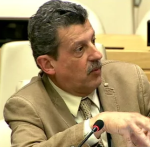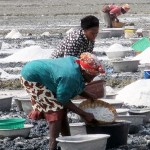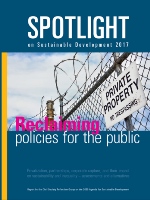Social Watch news
Published on Sun, 2017-08-20 22:26
In the first four months of 2017, severe floods isolated hundreds of Peruvian towns, leaving thousands of families homeless and destroying over 100 bridges. The waters have swept away bridges and roads. The Amazon, Marañón, Ucayali and Napo rivers, in the Amazon region, are under red alert because owing to a critical level of flow and danger of overflow. According to the World Bank, damage to the environment has an economic cost of 3.9 percent of gross domestic product (GDP), and mainly affects the poorest populations. In spite of te high vulnerability to human-made natural disasters, the national Social Watch report finds tenacious resistance to more sustainable practices by those who argue that environmental regulation is an obstacle to economic growth and corporate profits. |
Published on Sun, 2017-08-20 22:23
The Armenian government seeks to liberalize socioeconomic and political activities in a framework of respect for human rights and gender equality, acknowledges the national Social Watch report. Over the past 15 years, the poverty rate has fallen from 51 percent to 26.5 percent, but the unemployment rate is unchanged, which remains one of the main factors driving labor migration: almost one in four families (23%) in Armenia has members outside the country, of which 20 percent are in Russia and 3 percent in Europe. The analysis of the Center for Development of Civil society concludes that despite a certain increase in per capita income, the current level allows families to cover only the costs of food and some utilities, since the state's minimum wage and various allowances do not take into account needs for medical care, education, vacation time or cultural activities. |
Published on Thu, 2017-08-17 10:17
“Social Protection is a Human Right. Every right has a right holder and a duty bearer. We know who the right holders are: every human being, particularly those more in need of social protection: The right to be protected and cared is a right of children, the elderly, the sick, the people with disabilities" said Roberto Bissio, coordinator of Social Watch, speaking on behalf of the Global Coalition for Social Protection Floors (GCSPF) in the side event: “Global Partnership on Universal Social Protection: Ending Poverty by 2030” held during the HLPF on July 10th. |
Published on Wed, 2017-08-16 12:33
In discussions at the UN about achieving Agenda 2030, it has become de rigueur to highlight the role of the private sector. It is often introduced as the discovery of the idea that private sector investment and financing is indispensable to achieving Agenda 2030. For developed country diplomats and their associated experts this new celebrity treatment appears to be an article of faith, at least during negotiations on economic matters in the UN. |
Published on Mon, 2017-08-07 11:04
Reflections on the 2017 United Nations High-Level Political Forum on Sustainable Development. In his opening remarks, the UN Secretary-General said that 20 years ago “there was the idea that globalization would not only increase global wealth, but that it would trickle-down and would benefit everybody in our planet”. He went on to describe that at the present time, “globalization and technological progress have dramatically increased global trade and global wealth. It is true that the number of absolute poor has been reduced and that living conditions have improved all over the world but it is also true that globalization and technological progress together have been factors in the increase of inequality”. |
Published on Thu, 2017-08-03 09:29
The measures adopted by the Venezuelan government, in the context of the election of the Constituent Assembly and protests by those who question it, further aggravated the human rights situation in that country. On July 30, the government again responded with violence to demonstrations against it. On this occasion, ten people died, raising the number of people killed in protest situations to 119 in the last four months. According to investigations by the Public Prosecutor’s Office, a considerable percentage of these deaths resulted from shots fired by police and military officials. Other deaths are due to the actions of armed civilian groups that respond both to sectors of the opposition that propose an insurrectionary response and to para-state groups. In situations of protest, the state response must be based on the principle of protecting life; this emanates from states’ international human rights obligations. |
Published on Wed, 2017-08-02 10:16
For the third time in 10 years the government of Ghana is involved in a drive to stop illegal artisanal and small scale gold mining, popularly called 'galamsey'. Unlike the previous times the state is supporting rather than leading the campaign against 'galamsey'. There is currently a campaign spearheaded by the media against the activities of illegal gold mining in Ghana. This campaign has not only called for all unsanctioned and unregulated small- scale gold mining activities to be brought to a halt, but has also led to calls for the operations of legalized small-scale gold miners to be stopped as well. Ghana's policy makers have taken up the cause and have taken a series of actions aimed in the short term, at addressing the challenges posed by illegal small-scale gold mining, 'galamsey'. |
Published on Wed, 2017-07-19 10:45
On the last official day of the UN High-Level Political Forum, civil society express concern that ‘vision without implementation is hallucination’. New York, 19 July 2017: Despite soaring rhetoric, glossy reports and slick presentations, the fact remains that implementation on the ground is “stalled”, as highlighted in a series of civil society national reports as part of the global Spotlight Report initiative. Increasingly, civil society is expressing concern that the SDGs are being used not as a roadmap for social, economic and environmental transformation, but as a vehicle to entrench inequitable power relations. |
Published on Tue, 2017-07-18 08:52
“SDG-implementation: How are governments doing their part?” Alternative “shadow” reporting is a well-established tool of civil society to hold governments accountable to their commitments. A number of CSOs have prepared shadow or spotlight reports to follow-up on their governments efforts to implement the 2030-Agenda. Stalled, or slipping back, is the theme that appears in many of the contributions. |
Published on Tue, 2017-07-18 06:26
Conversation with authors of the Civil Society Report Reclaiming policies for the public: Privatization, partnerships, corporate capture and their impact on sustainability and inequality - assessments and alternatives The 2017 edition focuses on privatization, partnerships, corporate capture and the impact they have on sustainability and inequality. The articles and textboxes cover all sectors of the 2030 Agenda and the SDGs. According to the report, it is time to counter privatization trends, reclaim public policy space and take bold measures to strengthen public finance, regulate or reject PPPs, and weaken the grip of corporate power on people’s lives. These are indispensable prerequisites to achieve the SDGs and to turn the vision of the transformation of our world, as proclaimed in the title of the 2030 Agenda, into reality. |
SUSCRIBE TO OUR NEWSLETTER










